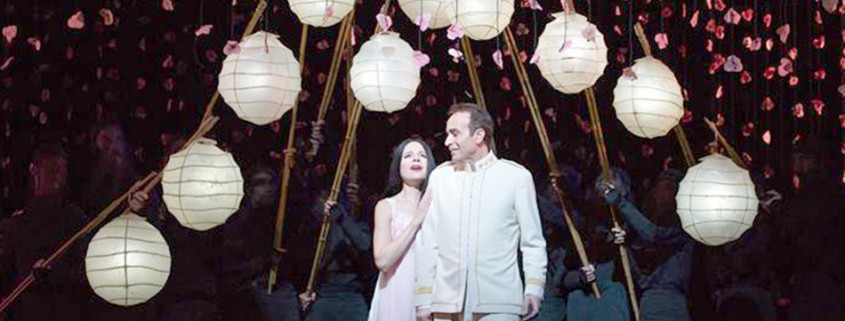Yellowface in opera is a problematic issue
This weekend, L.A. Opera will present a production of Giacomo Puccini’s Madama Butterfly. As an avid lover of Italian opera, particularly Puccini, I’ve had tickets for opening night for months now. Since the opera’s original premiere in 1904, Madama Butterfly stands as one of the most performed operas in history. However, in recent years, Madama Butterfly has also received much scrutiny over the use of yellowface widely used throughout the production.
The story, which centers around a forlorn Japanese geisha abandoned by an American Lieutenant, remains close to the hearts of audiences, but those who obtain a more complex understand of the opera often wonder why. Yes, while the score is considered a Verismatic vocal-and-orchestral masterpiece laden with pathos, the story itself is subpar at best. The plot is drenched with themes of sexism, misogyny and colonialism, not to mention the racism that occurs when attempting to cast the show. The title role is seldom ever sung by a Japanese soprano; in fact, most opera houses use yellowface when a non-Asian singer is hired. Moreover, the entire chorus is usually put in yellowface as well; thus, these problematic performance practices often outshine the beauty of the music itself.
However, it must be noted, with caution to not excuse the use of yellowface, that the role of Cio-Cio San is exceeding difficult and requires colossal vocalism and stamina. For this reason, there are only a token few sopranos who can sing the role well; thus, the best lirico-spinto, regardless of racial background, are hired to sing it. Ironically, it was Leontyne Price, the acclaimed black soprano, who was deemed among the best Cio-Cio Sans in the business. Perhaps audiences are still a sucker for love stories revolving around a beautiful, forsaken ethnic minority who is saved by a white man in order to achieve the “American Dream.” Perhaps it is this reason that Madama Butterfly remains so popular with older patrons, and that the idea that citizens in non-Western countries need to be “saved” by Anglo-Saxons Americans in order to reach happiness appeals to the pathos of this demographic.
Likewise, the same argument applies for Turandot, Puccini’s other East Asian-inspired opera. Though the story is set Imperial China, and almost all characters are of East Asian descent, rarely is a production staged with a full set of Asian singers. Like Madama Butterfly, almost every principle character requires a substantially sized voice, thus roles are assigned to the best performers who can sing them. With this philosophy in mind, and again careful not to excuse these outdated forms of costuming, it is slightly easier to comprehend this practice of color-blind casting. But again, it must be stressed that it takes a very specific singer to pull off these roles; they require not only sublime vocal technique and crisp dramatic interpretation, but also the singers hired for these roles must posses a voice big enough to phonate over the size of an Italian-style orchestra. Obtaining a voice of this quality lies beyond size, race or build, but relies upon the physiological logistics of the vocal chords; any vocal pedagogue will explain in great detail that one cannot simply train their voices to “be bigger.” This ability, this outstandingly rare ability, is one that a singer must be born with, and precisely why opera singers are among a select few in today’s society. Thus, the amount of singers able to produce such powerful vocalism is scant.
It is no secret that opera is a dying art form; it seems that millennials don’t have the same appreciation for classical music as previous generations. However, a contributing factor to opera’s declining popularity is perhaps due to the outdated performance practices employed in more traditional productions. And perhaps this is why younger generations, who believe these storylines are long outdated and deeply offensive, are straying from opera’s whitewashed perspective of life. And if opera companies wishes to thrive as they once did, the use of skin-color modification must be eliminated.
Arya Roshanian is a senior majoring in music. He is also a lifestyle editor at the Daily Trojan. His column, “From the Top,” normally runs on Tuesdays.

